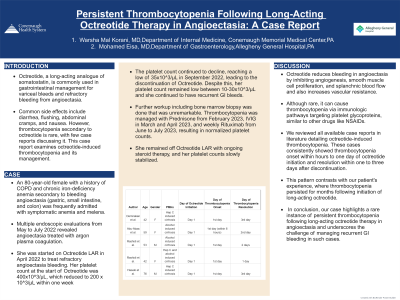Monday Poster Session
Category: GI Bleeding
P2495 - Persistent Thrombocytopenia Following Long-Acting Octreotide Therapy in Angioectasia: A Case Report
Monday, October 28, 2024
10:30 AM - 4:00 PM ET
Location: Exhibit Hall E

Has Audio

Warsha Mal Korani, MBBS
Conemaugh Memorial Medical Center
JOHNSTOWN, PA
Presenting Author(s)
Warsha Mal Korani, MBBS1, Mohamed Eisa, MD2
1Conemaugh Memorial Medical Center, Johnstown, PA; 2Allegheny Center for Digestive Health, Pittsburgh, PA
Introduction: Octreotide, a long-acting analogue of somatostatin, is commonly used in gastrointestinal management for variceal bleeds and refractory bleeding from angioectasia. Common side effects include diarrhea, flushing, abdominal cramps, and nausea. However, thrombocytopenia secondary to octreotide is rare, with few case reports discussing it. This case report examines octreotide-induced thrombocytopenia and its management.
Case Description/Methods: An 80-year-old female with a history of COPD and chronic iron-deficiency anemia secondary to bleeding angioectasia (gastric, small intestine, and colon) was frequently admitted with symptomatic anemia and melena. Multiple endoscopic evaluations from May to July 2022 revealed angioectasias treated with argon plasma coagulation. She was started on Octreotide LAR in April 2022 to treat refractory angioectasia bleeding. Her platelet count at the start of Octreotide was 400x10^3/µL, which reduced to 200 x 10^3/µL within one week. The platelet count continued to decline, reaching a low of 35x10^3/µL in September 2022, leading to the discontinuation of Octreotide. Despite this, her platelet count remained low between 10-30x10^3/µL and she continued to have recurrent GI bleeds.Further workup including bone marrow biopsy was done that was unremarkable. Thrombocytopenia was managed with Prednisone from February 2023, IVIG in March and April 2023, and weekly Rituximab from June to July 2023, resulting in normalized platelet counts. She remained off Octreotide LAR with ongoing steroid therapy, and her platelet counts slowly stabilized.
Discussion: Octreotide reduces bleeding in angioectasia by inhibiting angiogenesis, smooth muscle cell proliferation, and splanchnic blood flow and also increases vascular resistance. Although rare, it can cause thrombocytopenia via immunologic pathways targeting platelet glycoproteins, similar to other drugs like NSAIDs.We reviewed all available case reports in literature detailing octreotide-induced thrombocytopenia. These cases consistently showed thrombocytopenia onset within hours to one day of octreotide initiation and resolution within one to three days after discontinuation. This pattern contrasts with our patient's experience, where thrombocytopenia persisted for months following initiation of long-acting octreotide. In conclusion, our case highlights a rare instance of persistent thrombocytopenia following long-acting octreotide therapy in angioectasia and underscores the challenge of managing recurrent GI bleeding in such cases.
Note: The table for this abstract can be viewed in the ePoster Gallery section of the ACG 2024 ePoster Site or in The American Journal of Gastroenterology's abstract supplement issue, both of which will be available starting October 27, 2024.
Disclosures:
Warsha Mal Korani, MBBS1, Mohamed Eisa, MD2. P2495 - Persistent Thrombocytopenia Following Long-Acting Octreotide Therapy in Angioectasia: A Case Report, ACG 2024 Annual Scientific Meeting Abstracts. Philadelphia, PA: American College of Gastroenterology.
1Conemaugh Memorial Medical Center, Johnstown, PA; 2Allegheny Center for Digestive Health, Pittsburgh, PA
Introduction: Octreotide, a long-acting analogue of somatostatin, is commonly used in gastrointestinal management for variceal bleeds and refractory bleeding from angioectasia. Common side effects include diarrhea, flushing, abdominal cramps, and nausea. However, thrombocytopenia secondary to octreotide is rare, with few case reports discussing it. This case report examines octreotide-induced thrombocytopenia and its management.
Case Description/Methods: An 80-year-old female with a history of COPD and chronic iron-deficiency anemia secondary to bleeding angioectasia (gastric, small intestine, and colon) was frequently admitted with symptomatic anemia and melena. Multiple endoscopic evaluations from May to July 2022 revealed angioectasias treated with argon plasma coagulation. She was started on Octreotide LAR in April 2022 to treat refractory angioectasia bleeding. Her platelet count at the start of Octreotide was 400x10^3/µL, which reduced to 200 x 10^3/µL within one week. The platelet count continued to decline, reaching a low of 35x10^3/µL in September 2022, leading to the discontinuation of Octreotide. Despite this, her platelet count remained low between 10-30x10^3/µL and she continued to have recurrent GI bleeds.Further workup including bone marrow biopsy was done that was unremarkable. Thrombocytopenia was managed with Prednisone from February 2023, IVIG in March and April 2023, and weekly Rituximab from June to July 2023, resulting in normalized platelet counts. She remained off Octreotide LAR with ongoing steroid therapy, and her platelet counts slowly stabilized.
Discussion: Octreotide reduces bleeding in angioectasia by inhibiting angiogenesis, smooth muscle cell proliferation, and splanchnic blood flow and also increases vascular resistance. Although rare, it can cause thrombocytopenia via immunologic pathways targeting platelet glycoproteins, similar to other drugs like NSAIDs.We reviewed all available case reports in literature detailing octreotide-induced thrombocytopenia. These cases consistently showed thrombocytopenia onset within hours to one day of octreotide initiation and resolution within one to three days after discontinuation. This pattern contrasts with our patient's experience, where thrombocytopenia persisted for months following initiation of long-acting octreotide. In conclusion, our case highlights a rare instance of persistent thrombocytopenia following long-acting octreotide therapy in angioectasia and underscores the challenge of managing recurrent GI bleeding in such cases.
Note: The table for this abstract can be viewed in the ePoster Gallery section of the ACG 2024 ePoster Site or in The American Journal of Gastroenterology's abstract supplement issue, both of which will be available starting October 27, 2024.
Disclosures:
Warsha Mal Korani indicated no relevant financial relationships.
Mohamed Eisa indicated no relevant financial relationships.
Warsha Mal Korani, MBBS1, Mohamed Eisa, MD2. P2495 - Persistent Thrombocytopenia Following Long-Acting Octreotide Therapy in Angioectasia: A Case Report, ACG 2024 Annual Scientific Meeting Abstracts. Philadelphia, PA: American College of Gastroenterology.

